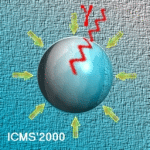
ICMS'2000
The International Conference on Multiphase Systems, ICMS'2000
Ufa, RUSSIA, June 15-17, 2000
Liapidevskii V. Yu.
Lavrentyev Institute of Hydrodynamics, Siberian Division of RAS., Novosibirsk, RUSSIA
The bubble detonation, i.e. formation and propagation of steady--state soliton--like structures in a liquid containing gas fuel bubbles is studied analytically. An interesting peculiarity of the phenomenon under consideration is an essential dependence of detonation velocity on viscosity of a liquid. This may be explained theoretically with the help of one-- or two--pressure models whose analysis gives upper and lower bounds for self--sustained wave velocities in a bubbly liquid. The lower bound of the detonation velocity has been shown to follow from the Chapman--Jouguet condition for an equilibrium model, while the two--pressure one taking into account bubble oscillations admits only underdriven detonation corresponding to the upper bound of wave velocities observed experimentally. The usage of chemical reaction energy makes impossible the repeated wave propagation through the reacted mixture. Thus, creating recoverable media capable of transferring a part of its energy to the wave is rather actual. This paper considers a mathematical model of gas--liquid medium, where the energy necessary to sustain a wave is stored due to a continuous heat supply to a fixed part of the gas--filled cavity. A gaseous phase represents a two--temperature medium with different compression--expansion adiabates. It has been shown that the wave with a minimum possible velocity has a structure analogous to that in bubble detonation.